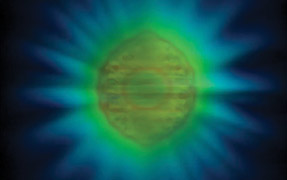SPIE Smart Structures + Nondestructive Evaluation and Health Monitoring (SS/NDE) is paying a visit to Portland, OR (USA), in March. This annual meeting explores the fields of advanced “smart” materials and sensor systems for nondestructive structural health monitoring.
The 2017 program, 25-29 March, will feature over 800 technical presentations in 11 conferences, six plenary speakers, and more than 20 live demonstrations on electroactive polymers (EAPs), soft robotics, and advanced 3D printing.
The SS and NDE communities are visionary groups that continually reimagine the relationship between people and their environment. They come together once a year to discuss the best and latest research on novel materials and sensor networks. These are no trivial matters, either.
Advanced materials and NDE have a range of important applications in transportation, aerospace, healthcare, energy, and civil infrastructure. How do we improve health and safety monitoring for bridges and buildings? What kinds of wearable technologies will allow people to monitor their personal health? Scientists and engineers in this community are working to find creative answers to these questions and more.
 “The SPIE SS/NDE event is one of a kind,” says SPIE member Jayanth Kudva, founder of NextGen Aeronautics (USA) and the symposium chair with SPIE member Theo Matikas of University of Ioannina (Greece).
“The SPIE SS/NDE event is one of a kind,” says SPIE member Jayanth Kudva, founder of NextGen Aeronautics (USA) and the symposium chair with SPIE member Theo Matikas of University of Ioannina (Greece).
The conferences at SS/NDE, Kudva notes, bring together “fundamental research and seed ideas from academia; developmental projects; applications from industry; long-term R&D roadmaps; and perspectives from government organizations — all under one overarching event with participants from all over the world.”
The plenary speakers and their topics illustrate a broad spectrum of scientific advances and historical perspectives. They include David F. Hanson, founder and CEO of Hanson Robotics (USA), who will discuss EAP artificial muscle actuators for bio-inspired intelligent social robotics, and Chiara Daraio of the California Institute of Technology (USA) giving a talk on plant nanobionic materials for thermally active, soft, artificial skins.
Other speakers at the 26 March plenary session are
- SPIE Senior Member James E. Hubbard, of University of Maryland, College Park (USA), giving a personal historical perspective on adaptive structures
- SPIE member Victor Giurgiutiu of University of South Carolina (USA), discussing predictive simulation of structural health monitoring
- SPIE member Norbert Meyendorf of Iowa State University (USA), discussing NDE requirements for the 21st century
- David J. Ewins of Imperial College London (UK), speaking on his vision for an integrated test-analysis strategy on for next-generation structures
A conference to be held 29 March will honor smart materials pioneer Daniel Inman, an SPIE member and chair of the Department of Aerospace Engineering at University of Michigan (USA). The conference will include presentations on self-sensing actuation, morphing structures, structural health monitoring, and energy harvesting.
A tribute luncheon for Inman will also be held on 28 March. Inman received the SPIE 2003 Smart Structures and Materials (SSM) Lifetime Achievement Award.
The 2017 SSM Lifetime Achievement Award will be presented to SPIE member Ralph C. Smith of North Carolina State University (USA) on Sunday, at the start of the plenary session.
Jianmin Qu, dean of the School of Engineering at Tufts University (USA), will receive the 2017 NDE Lifetime Achievement Award.
Special events include the 19th annual EAP-in-Action session and demonstrations on Sunday and a 3D printing demonstration session on Monday. Keynote presentations during the week will highlight electroactive polymers for healthcare and biomedical applications (Siegfried Bauer of Johannes Kepler University in Austria) and epidermal electronic systems for sensing and therapy (Nanshu Lu of University of Texas at Austin in the USA).
Cochairs of SPIE SS/NDE are SPIE member Tribikram Kundu of University of Arizona and Gregory W. Reich from the US Air Force Research Lab.
For more information about how smart sensors and other photonics technologies are making a better world, read the Photonics for a Better World blog:
- Ants, bees, and octopuses: bioinspired robotics, drones, and smart structures
- Temperature-sensitive technology for artificial skins: smart structures
Learn more about SPIE Smart Structures + Nondestructive Evaluation and Health Monitoring.
- Have a question or comment about this article? Write to us at spieprofessional@spie.org.
- To receive a print copy of SPIE Professional, the SPIE member magazine, become an SPIE member.



